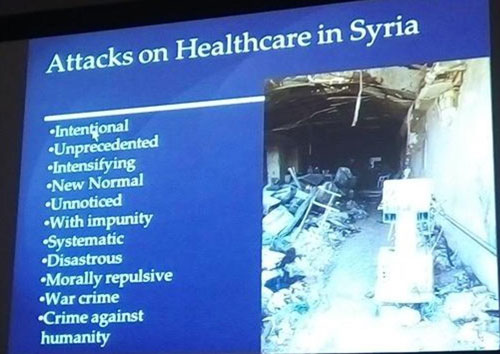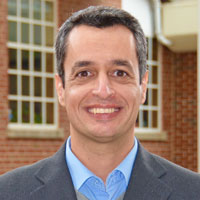Jaff participates in APHA panel on health-care delivery in conflict zones
November 30, 2015
Dilshad Jaff, MD, MPH, research adviser for conflict prevention and disaster preparedness at the UNC Gillings School of Global Public Health’s Gillings Global Gateway™, served as a panelist in an American Public Health Association (APHA) session on the challenges of health-care delivery in areas of conflict and war. The session, “Practicing Health Care in Situations of Violence,” was part of the APHA annual meeting, held Oct. 31 to Nov. 5, in Chicago.
Jaff, a 2015 alumnus of the Gillings School, joined fellow panelists from Physicians for Human Rights, Medicines Sans Frontiers, the International Committee of the Red Cross and the Syrian American Medical Society to describe the scope of attacks on health care around the world, strategies of health providers who are called upon to work when at risk for violence, and the international community’s response to the challenges.
Jaff shared his experiences from the 2003 war in Iraq, where he saw health care systematically targeted. He worked as primary health district manager under the Iraqi Ministry of Health from 2003 to 2008, trying to prepare health-care workers for dealing with incidences of violence.

A slide presented by the panel described the nature of attacks on health-care workers and facilities in Syria.
“Better communication and coordination between involved global and local actors, including nongovernmental organizations and the military, is required.” he said. “The need for collective, coordinated action has never been greater.”
The Geneva Conventions and their protocols were established in 1949 to protect health-care workers and health facilities from being attacked during armed conflicts and other violent emergencies. Today, these fundamental standards are being violated with impunity — an unacceptable situation by any moral or legal standard, Jaff said.
According to the Red Cross, at least 4,275 people in 11 countries were victims of violence against health-care facilities between January 2012 and December 2014.
“This is likely an underestimate of the extent of this problem, which is all the more troubling,” Jaff said.
Among the issues addressed during the session were:
- the scope of the problem and the public’s limited knowledge of it;
- the experience of providing health care in fraught environments, including in Syria where sustained attacks on health services have been launched;
- the causes and dynamics of such attacks;
- mechanisms and initiatives to support health workers in volatile environments; and
- recent initiatives by the U.N. General Assembly, the World Health Organization and other entities to strengthen norms of protection and hold perpetrators accountable for violence against health care workers and facilities.

